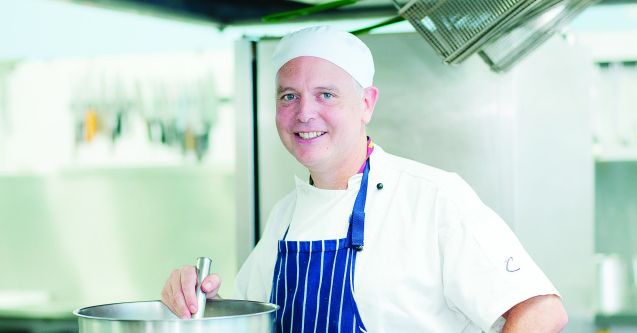Transformation from terror
2 September 2014

“The weekend I decided to end my life, I woke to helicopters flying above my place. I thought they were after me. I started running down the street. I rang my boss to say I wouldn’t be back. I threw my phone into the ocean. I was scared.” – Jason
Jason is a cheerful, prayerful, encouraging presence and unofficial mentor to the 100 or so men he feeds at The Salvation Army’s Brisbane Recovery Services Centre (also known as Moonyah).
Jason says he loves to encourage participants to go the distance in the recovery service’s residential program, despite the hard times and struggles.
It is especially meaningful to Jason, because before he was employed as the Moonyah chef, he was a resident of Moonyah himself. His life before the program was a dark tangle of extreme drug and alcohol-induced paranoia.
Jason’s parents split when he was nine and he became a difficult young man for his mum to manage.
Addiction and paranoia
He left home at 16, moved in with like-minded mates and the next 20 years became a cycle of moving towns, changing jobs and getting drunk. By his early 30s, he was heavily drinking, drug-taking and extremely paranoid.
He thought people were following him and he had lost all sense of reality.
“I didn’t want to live like this anymore and thought that death would be a good option,” he says.
“If I didn’t get help, I would have been dead for sure by now.”
Jason was hospitalised and his doctor suggested his addiction was most likely the source of his paranoia. His mum drove him to Moonyah and, nine months later, he graduated.
Transformation and freedom
The courses, the counselling, the groups and watching the transformation of others, all had an enormous impact, but he says he believes his true turning point was also spiritual.
Jason says he loves sharing his story with others because he knows that although it is not an easy walk, there is hope for all.
“I get so much encouragement out of seeing people change. I know that my life changed from being selfish to being full of gratitude,” he says.
“Jesus says in the Bible: ‘Follow me’. I did and I have come out of the awful darkness into this beautiful new life.”
By Bill Simpson
The Salvation Army Recovery Services offers a number of long-term residential treatment facilities to help people find freedom from addiction. It also offers a range of non-residential services, including out-client case management services and youth services, through Salvation Army Corps (churches) and centres, and provides residential withdrawal management services (commonly referred to as detox). Around 3600 people are supported in residential services in NS W, ACT and Qld each year.
In recent years, the Salvation Army Recovery Services has won a number of prestigious awards, including the 2010 University of Wollongong Vice Chancellor’s Award for Outstanding Achievement in Research Partnership; the 2012 National Drug and Alcohol Awards Excellence in Research; then in 2013, the ‘Treatment and Support’ award as well as the ‘Significant Contribution to the Therapeutic Community movement in Australasia by a Program, Service or Intervention’.
Comments
No comments yet - be the first.